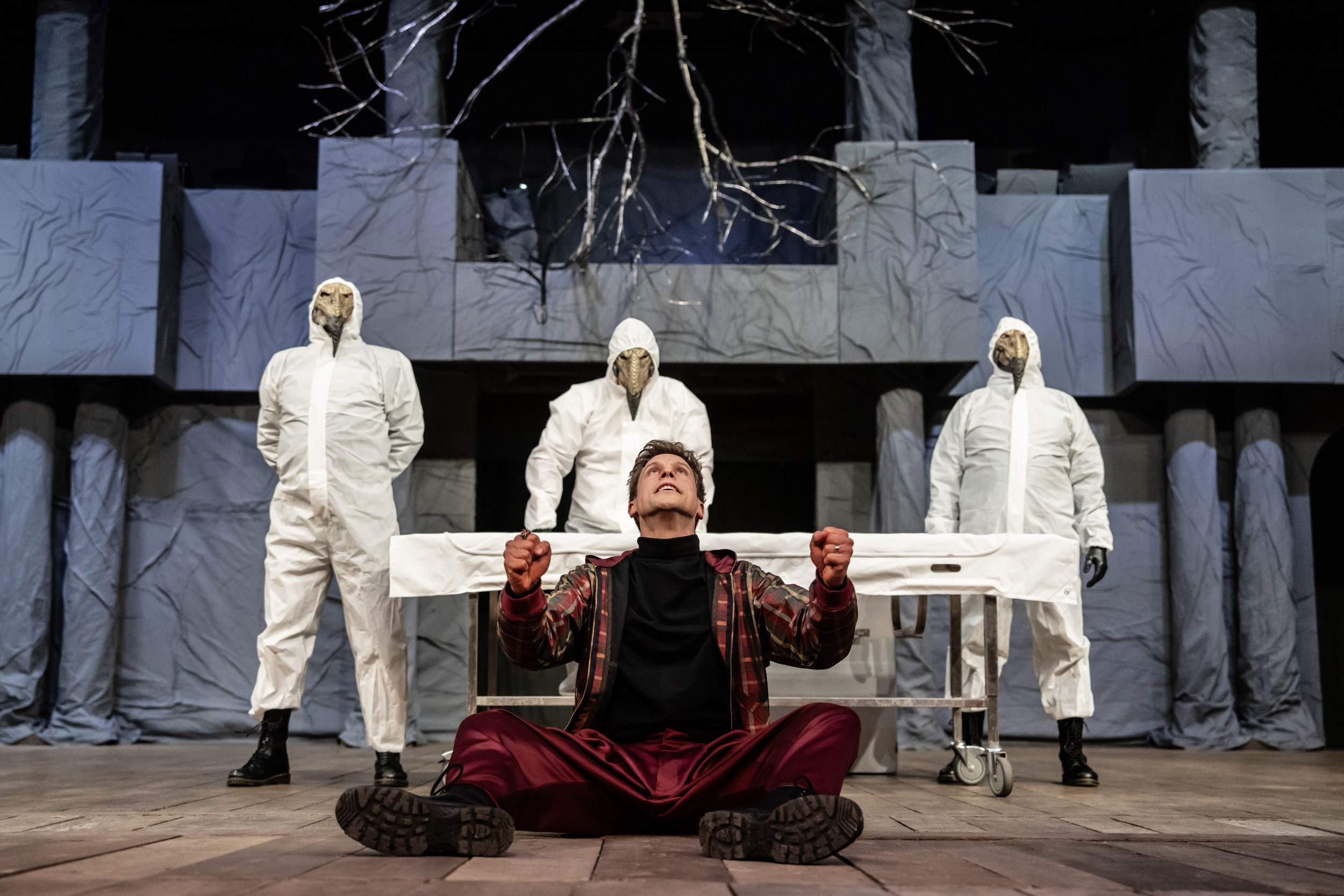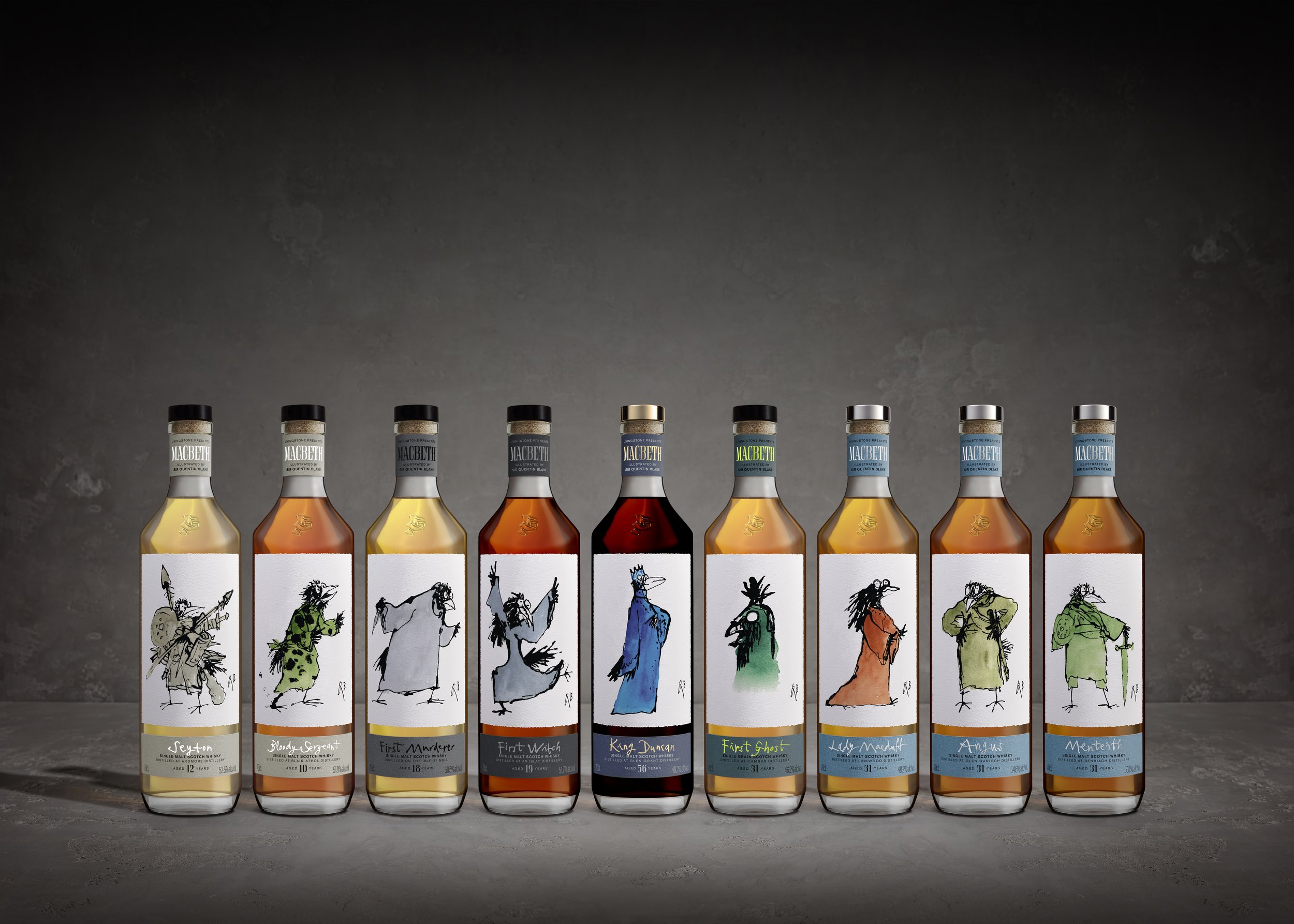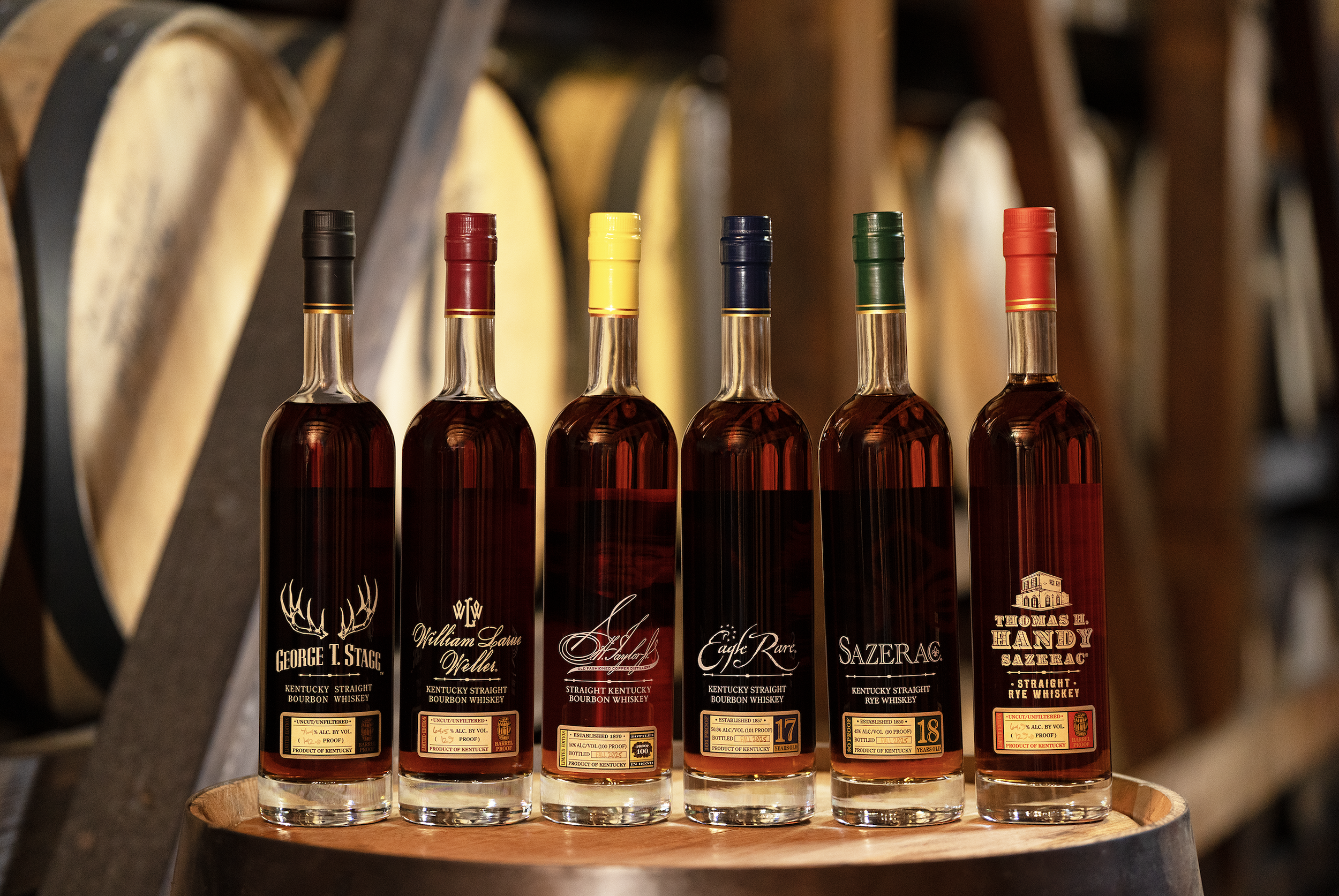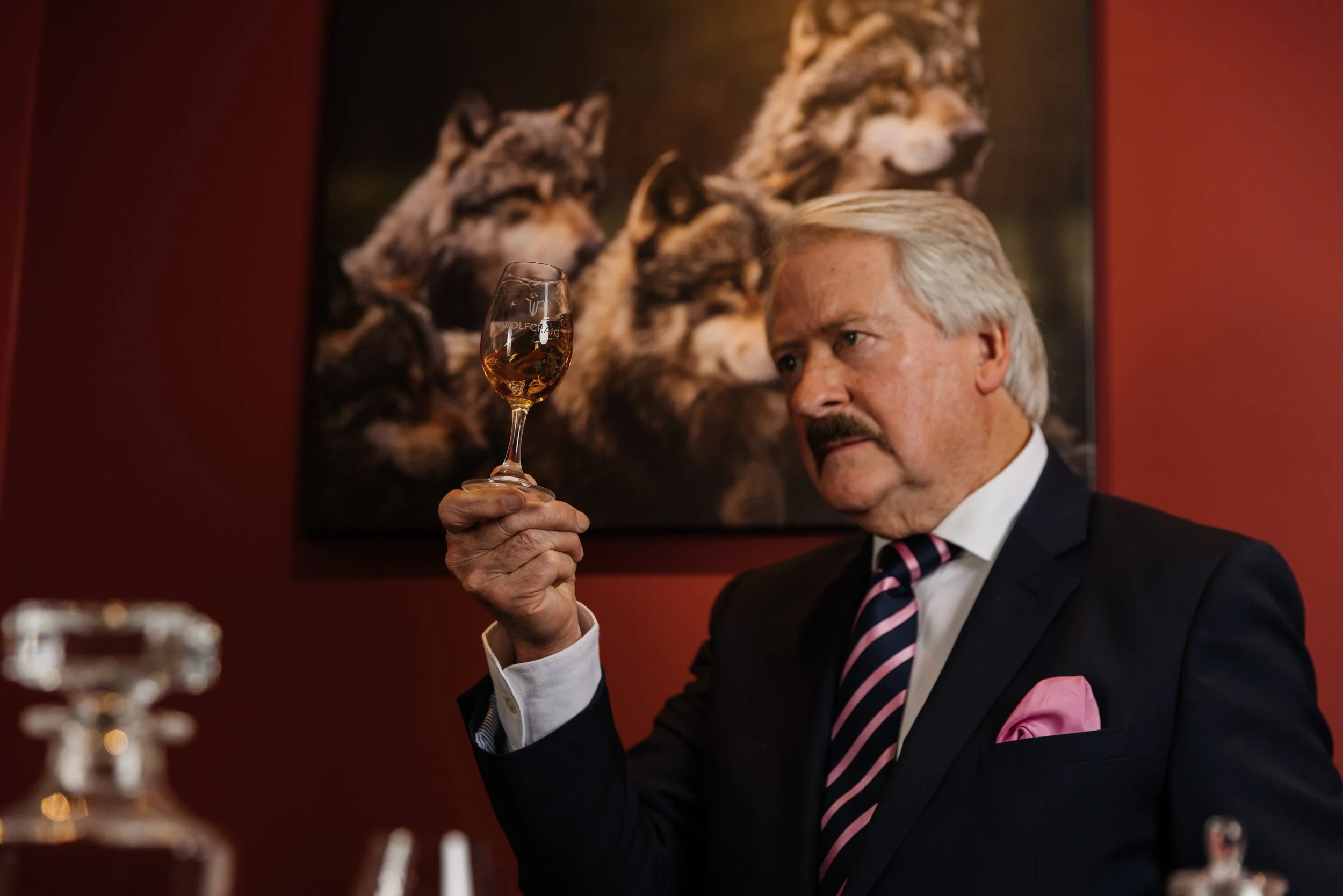Is this a dram which I see before me?
Alexis and Max photographed for Barley by David Startin outside Shakespeare’s Globe Theatre, London, October 2023
Max Bennett is fresh from an acclaimed performance as Macbeth at Shakespeare’s Globe Theatre. Alexis Burgess is the pioneer and brains behind a dazzling Scotch whisky collection — 42 bottles featuring every character from Shakespeare’s bloody tragedy. The two Macbeths sat down for Barley to talk (and sip) drams, dreams and the curse of the Scottish play
Alexis Burgess: Congratulations. I thought the show was wonderful. It’s strange for me, having had my head inside Macbeth for the last five years on my whisky project, to come and see a production and still be both shocked and surprised by it. And very moved.
Max Bennett: That’s a huge compliment, thank you.
AB: I’ve been to the Globe two or three times before, and I’m always astonished at how the acoustics work. You can hear absolutely everything, even when the actors are facing away from you.
MB: Yes, it’s quite a radical space, even if it’s viewed as very traditional. Increasingly in theatre, actors are microphoned up. So, this is one of the few spaces in London where you will hear the human voice as it is, without amplification. It might seem like a small thing, but theatre, at its base level, is just bodies in a space, and the reason you are implicated in it is because the person onstage is the same as you. Even a small barrier, like a mic, slightly distances you. So, the Globe is very pure in that regard. There is literally no barrier. The audience can reach out and touch you.
AB: And I presume they try to.
MB: Ha! Yes. During one of Lady Macbeth’s soliloquys I sit on the steps at the front of the stage that lead down into the yard. It’s only a few lines long and I could hear these two teenagers in the audience next to me, one was whispering to the other “touch his hair, touch his hair”. I could feel the hand coming across, and if the speech had gone on any longer, I reckon they would have been stroking my head.
AB: I’d also never been here for a matinee, in broad daylight. It’s a strange play to be performing outdoors on a sunny afternoon. But actually, it was remarkable. You can see absolutely everything, and it doesn’t take away any of the horror of it. If anything, it’s amplified. I thought the murders were particularly horrific. There is no smoke and mirrors, you really see them. It’s physically shocking.
Max Bennett as Macbeth as the Globe; photograph by Johan Persson
AB: I thought it would be interesting for us to both talk about Macbeth from our individual perspectives, me, as a person who’s trying to cast all 42 characters in the play as different whiskies, and you as an actor who has just played Macbeth for four months. Shall I explain a little about my project before we start?
MB: Go ahead.
AB: I’d been reading a lot about the history of distilling in Scotland, and for the most part it’s just families trying to kill each other. Brothers, cousins, all letting their egos get the better of them. At a certain point I thought “this is just like Macbeth.” And that was it; the most perfect structure for a Scotch whisky collection began to appear before me.
‘I’d been reading a lot about the history of distilling in Scotland, and for the most part it’s just families trying to kill each other. I thought “this is just like Macbeth” — Alexis
You had five lead characters, who could be seriously old and rare single malts, then there were the Thanes, the royal court, who could be big malts with some decent age on them. There are also the witches, perfect for some sort of blending story. There are four murderers in the play, I thought they could be a pretty violent gang, and there’s also ten household characters, smaller parts that we could have some fun with, and release some more affordable whiskies at greater volumes so people had a chance to get hold of them to drink. Finally, of course, there are six ghosts in the play, which are perfect to cast as ghost distillery whiskies.
MB: A ghost distillery is where the distillery is gone, but the cask remains?
AB: Yes, they have been the hardest whiskies to find. The project structure worked beautifully, but I still needed something visual to bring it to life. I’ve been lucky enough to work with the illustrator Quentin Blake for over twenty years (he’s 90 now) and I finally plucked up the courage to ask him if he’d be interested in drawing all 42 characters. At first he showed little enthusiasm. I don’t think he could see a way to make drawing 42 men in kilts enjoyable, and he doesn’t do any commercial work. I suggested he draw them as birds, and then he said yes, as he loves drawing birds.
VIDEO: Watch Max Bennett and Alexis Burgess talk Macbeth, whisky and more
At that point I knew I had something very special, and I started to feel the pressure to really deliver on it. I realised I was going to need an expert in both whisky and Shakespeare if we were going to cast the whiskies convincingly. I wrangled an intro to Dave Broom, a whisky writer I have always admired, explained the project, and asked if he would write the character profiles for me. He ended up providing an entire narrative structure, together with a paragraph on each character, describing what type of whisky they would be. Not a list of distillery names, or cask types, but a very rounded, and sometimes fairly esoteric description of a person via flavours and attributes of whisky. It was pretty wild.
‘I finally plucked up the courage to ask illustrator Quentin Blake to draw all 42 characters from the play. He wasn’t enthusiastic until I suggested he draw them as birds, and then he said yes, as he loves drawing birds’ — Alexis
MB: Sounds exciting.
AB: Yes, it was but I still didn’t have any whisky! And I needed 42 different whiskies, some of which were very old and rare. I could count on my fingers the number of people who have access to that kind of stock, and then chop each finger off, one by one, as they said no. But a good friend introduced me to Sukhinder Singh and Oliver Chilton, of Elixir Distillers, and they took one look at the drawings, and said yes. I think Sukhinder just liked it, and that was enough for him. He’s a real outlier in the whisky business. He started as a retailer and a collector, and later moved into bottling and now distilling, and he’s still in touch with his passion for all those aspects of the trade. He loves whisky. And so does Ollie. Ollie is so talented.
MB: What does Ollie do?
AB: He’s the master blender. If there is one part of this whole project that hasn’t caused us any trauma, it’s been the whiskies. The whiskies he’s found, or made, have all been exceptional. They are phenomenal.
King Duncan from the Macbeth Scotch Whisky collection; photography by John Short
MB: How did you end up releasing the collection?
AB: In our ‘First Act’ we have released 9 characters, but we aren’t going to drink though all nine today, which I suppose is a good thing, as quite a few of these characters aren’t in your show.
MB: Ah yes, the many Thanes. We have no Angus or Menteith in our production. Don’t they only have about one line each? They ended up on the cutting room floor.
‘I didn’t want to tell you beforehand, but our witches look very similar to yours. They wear Hazmat suits when they are performing their rituals and cover their faces with what look a bit like old plague masks’ — Max
AB: Well, that’s unlucky for you, given the whiskies we’ve got for them, a 31-year-old Glen Garioch for Angus, and a 31-year-old Benriach for Menteith, which are both delicious. But we can start our tasting with the First Witch, who comes on right at the beginning, after all. In a conventional tasting you’d probably put the big peated stuff towards the end, to preserve your palate, but given this is a discussion about murder, I think we should get straight into it.
MB: I have to say, I love the illustrations, particularly the witch. I didn’t want to tell you beforehand, but our witches look very similar to yours. They wear Hazmat suits when they are performing their rituals and cover their faces with what look a bit like old plague masks; they have big beaks, very reminiscent of birds. They look like the drawings.
The ‘hazmat-suit’ witches from the Globe’s production of Macbeth; Johan Persson
First Witch: A 19-year-old Ardbeg aged 17-years in a bourbon barrel and two years in a Sherry cask
AB: I know! I was thrilled when I saw that. So, our First Witch is a 19-year-old Ardbeg, from the island of Islay, off the west coast of Scotland. We are hoping that all three of our witches will come from there. It’s a very spooky place; the church in Bowmore is round, to stop the devil hiding in the corners.
It’s been 17 years in a bourbon barrel, to give it that classic Ardbeg profile and then two years in an Pedro Ximenez cask, to give that dark, sherry body. As Dave’ Broom’s character description says, it’s “of a world of smoke and tar, fish livers, and enveloping violet night”
MB: [Taking a sip] Wow, that’s delicious.
AB: Yes, it’s pretty special. Dave came up with an overall narrative structure for the play, where evil would be signified with smoke, and sherry. For base evil characters, like the murderers, this can be really thuggish peat, but as the evil works its way up through the characters, in terms of power and influence, it becomes more sophisticated. By the time it’s reached the witches, it is older and more manipulative, until it finally reaches its apex in the Macbeths.
‘The First Witch has been 17 years in a bourbon barrel then two years in an Pedro Ximenez cask, as Dave Broom’s character description says, it’s “of a world of smoke and tar, fish livers, and enveloping violet night”’ — Alexis
Our plan is to release the three witches as peated Islay malts, and then mix those three witches together at the end, to create a blend, which will be the Hekate. The Hekate becomes, in effect, the potion the three of them are making round the cauldron. That will be something truly evil.
MB: I’m glad you are including Hekate. She’s important. She’s the boss of the witches, the goddess of the crossroads, and she actually comes to remonstrate with them for giving Macbeth all this power he can’t handle, but the scenes she appears in are often cut, and probably aren’t written by Shakespeare. It doesn’t mean she isn’t a powerful character.
A few weeks ago, the curse of the play was truly alive and well. We were all falling to pieces, everyone was getting injured or ill. We are outside all the time, exposed to the elements and things just kept going wrong. I saw Mark Rylance and Claire Van Kampen, who used to run the Globe and have an interest in paganism and old religions, and asked them what to do. And their responses were both the same: “Have you cut Hekate from the play?” And I said, “yes, doesn’t everybody?” “Well, then, you need to make an offering to Hekate.”
Now, I am very much an agnostic, and since we were becoming a bit desperate, we thought we’d give it a try. A couple of us got together and made the offering as they instructed and hung it in the eaves of the theatre. And since then, things have greatly improved.
‘A few weeks ago, the curse of the play was truly alive and well. We were all falling to pieces, everyone was getting injured or ill. We are outside all the time, exposed to the elements and things just kept going wrong’ — Max
AB: I’m not surprised. Of all the whiskies I have ever released, both in my design life or within this collection, The First Witch has been the most difficult. It preyed on everybody’s fears, caused arguments, sowed suspicions. When we get to the end of the collection, and the Hekate is finally out there to protect us, I might feel able to tell you about it.
In the meantime, we should enjoy this old Ardbeg, which is a rare treat, whilst we get into the big questions…
Matti Houghton as Lady Macbeth at the Globe theatre
AB: Why do you think Macbeth behaves the way he does?
MB: I think it’s rooted in grief. The Macbeths have lost a very young child, a cot death in our version, and before there is any opportunity for them to grieve, a war starts, and Macbeth is whisked away. He travels directly from a domestic tragedy into a combat zone, which is obviously traumatic in its own way. And then after the battle, he comes straight back home.
I have a friend, a Major in the army, who described to me the process of returning from the battlefield, when you are put through what’s known as decompression. You are stepped into a closed environment, and kept away from civilian contact for a few weeks until most of it is out of your system. Macbeth doesn’t do that. There is no decompression. He’s off the battlefield and straight back to his wife.
Max Bennett as Macbeth
I think Shakespeare is interested in saying okay, over there you can ‘unseam someone from the nave to the chops’, and cut their head off, and society says, ‘yes, you are a valiant gentleman’, and then you go home and kill somebody in their bed, when they’re a guest at your house. And it’s horror. Why Macbeth is so interesting is because it's domestic. The Macbeths try to seize power while they are having a dinner party at their house.
AB: As terrible as it sounds, I don’t look at Macbeth and think it would be entirely beyond me to do those things.
‘I think Shakespeare is interested in saying okay, you can ‘unseam someone from the nave to the chops’, and cut their head off, and society says ‘yes, you are a valiant gentleman’, and then you go home and kill somebody in their bed, when they’re a guest at your house’ — Max
MB: Well, that’s very honest of you, because I think most people would go, ‘I could never do that.’ But I think what's interesting about good writing and good theatre is that it is challenging you to ask the question. Macbeth has a moral compass throughout, an awareness, a consciousness of the horrors that he’s doing, whilst doing them; he’s not Richard the Third who delights in his horrors most of the time. Macbeth is also the first person in the play to use the word murder, so I don’t know how some audiences have come to blame Lady Macbeth for everything when it’s clearly a joint endeavour.
For me, the murder itself, the blood on Macbeth’s hands, triggers a full PTSD reaction in him, and he ends up in full psychosis.
There was a visionary psychiatrist called Murray Cox, who invited Mark Rylance and the RSC to perform Hamlet, Romeo and Juliet and King Lear in Broadmoor for the patients. He wanted to use the plays to help people who had done these terrible things to see themselves, and empathise with the victims, and themselves, and to help them on their journey towards rehabilitation. I think people came on leaps and bounds in their understanding of what they had done, by watching it be played out.
Some of the Broadmoor patients make it passive: ‘Then the knife went in’. Macbeth does the same just before Duncan’s murder, after he hallucinates a dagger, a bell rings, and Macbeth says, ‘I go, and it is done; the bell invites me.’ The mechanism has taken over, the wheels are in motion and he’s got to do it.
AB: Shall we have another whisky? We could try Seyton. Macbeth’s armour bearer? How are you pronouncing him? ‘Seeyton’, or ‘Satan’?
Seyton: Matured in ex-Laphroaig barrels, ‘to give a hint of that phenolic darkness’
MB: We pronounce it ‘Satan’, as we want that double meaning to come through. I think it’s an intended play on words; there is a speech in the final act when Macbeth is asking for his armour, and in our version, it never arrives. It’s the point you feel the power is going from the tyrant; when even the closest servants start disobeying orders.
When he’s calling for Seyton, who is he summoning? Because if you want to summon the devil, all you have to do is say his name three times, and he appears…
AB: It was a tricky whisky for us to find. Smoke is our overall signifier of evil but it isn’t entirely clear that Seyton is evil; there is a contrast in him that needs to be reflected in the whisky. Ardmore is a peated highland, which is quite unusual, and this one had also been matured in ex-Laphroaig barrels, to give a hint of that more phenolic darkness. So, it’s smoky on the nose, but the palate is surprisingly honeyed, herbaceous and sweet. Then the smoke kicks back in again at the finish. You never quite know where you are with Seyton.
‘Seyton is smoky on the nose, but the palate is surprisingly honeyed, herbaceous and sweet. Then the smoke kicks back in again at the finish. You never quite know where you are with Seyton’ — Alexis
MB: Yes, I can taste that. There is a lot of equivocation in him.
AB: What are you doing next?
MB: I’ve got a couple of nice things coming out. I’m in the next series of Slow Horses on Apple, which is fantastic, and due to be released late this year. Then I’m in a new comedy series called Big Mood, which is really brilliant. It’s very rare that you read comedy scripts that make you laugh out loud, so I’m excited about it. It will be out on Channel 4 at some point next year.
AB: Well thanks Max, it’s been a real pleasure for me.
MB: Me too. What a nice thing to do.
Act One of The Macbeth Collection is on sale now via Livingstonerare.com and selected global retailers
















